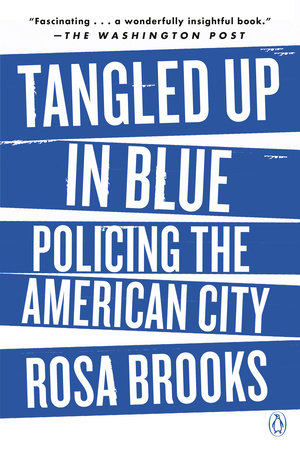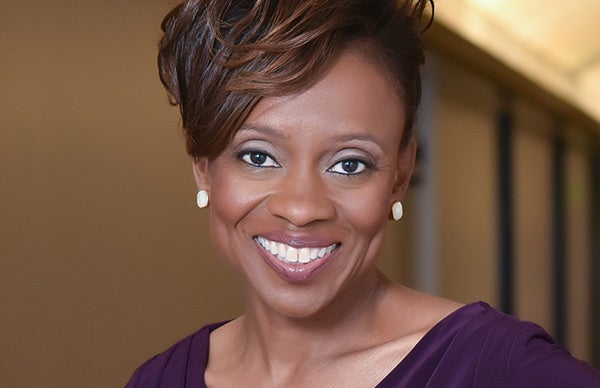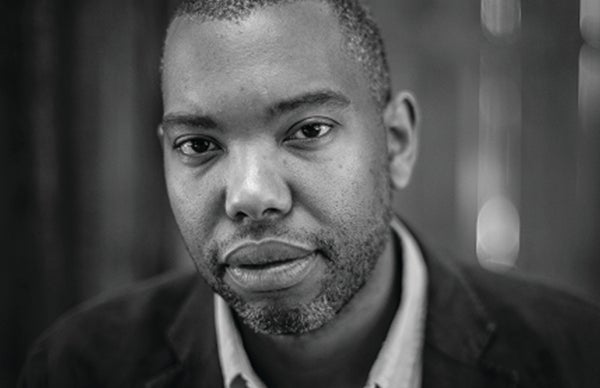Rosa Brooks
American law professor and author of Tangled Up in Blue

Photo Credit: Jody McKitrick
-
About Rosa Brooks
Rosa Brooks is the Scott K. Ginsburg Professor of Law and Policy at Georgetown University Law Center, where she founded Georgetown’s Innovative Policing Program. Drawing upon four years as a sworn, armed reserve police officer with Washington D.C. Metropolitan Police Department, she challenges current policing practices and identifies ways to make policing more equitable—and more effective at protecting communities. The program she leads rethinks the role police should play in today’s diverse and democratic society and helps communities, police, and the broader legal system to work together to address the toxic legacy of racial discrimination and over-criminalization.
Along with her policing work, Rosa Brooks is an expert on national security, international law, constitutional law, and criminal justice. Brooks served as an unpaid advisor on defense policy to the Biden campaign, and during the Obama administration, she served as the counselor to the Under Secretary of Defense for Policy. She founded the Defense Department’s Office for Rule of Law and International Humanitarian Policy, and was awarded the Secretary of Defense Medal for Outstanding Public Service. Previously, Brooks served as a senior advisor at the Department of State under the Clinton administration. She has also served as a consultant for Human Rights Watch. She co-founded the Leadership Council for Women in National Security (LCWINS) and the Transition Integrity Project, a short-term project to conduct scenario-based exercises aimed at identifying potential risks to the integrity of the 2020 election and transition process.
Rosa Brooks is also the author of New York Times 2016 Notable Book, How Everything Became War and the Military Became Everything, an important and compelling examination of the role of the military today, told from her point of view as a former top Pentagon official and military spouse. How Everything Became War and the Military Became Everything was shortlisted for the Lionel Gelber Prize and was named one of the five best books of 2016 by the Council on Foreign Relations. Her latest book, Tangled Up in Blue, recounts her experiences inside the usually closed world of policing— and offers a reality more complex than what the headlines suggested. Brooks speaks on the need for new laws and institutions, arguing that in a nation increasingly divided by race, class, ethnicity, geography, and ideology, a transformative approach to policing requires us to move beyond sound bites, slogans, and stereotypes.
Rosa Brooks has previously written a weekly column for the Los Angeles Times and Foreign Policy, and makes frequent contributions to The New York Times, Wall Street Journal, The Washington Post, among other publications. She makes frequent appearances as a guest and panelist on MSNBC, Fox, CNN, and NPR to speak on law, foreign policy and political issues.
Rosa Brooks graduated from Harvard University, where she served as the president of Harvard’s undergraduate public service organization, the Phillips Brooks House Association. She earned her Juris Doctor from Yale Law School.
Contact us about booking Rosa Brooks for your next event.
-
Speaking Topics
Can Policing Be Fixed?
With a full-time job as a tenured law professor at Georgetown University, Rosa Brooks decided to become a sworn, armed reserve police officer to understand how police officers make sense of their world and whether that world can be changed. In this engaging and timely discussion, Brooks, the founder of the Georgetown’s Innovative Policing Program, examines the complex intersections of race and socioeconomic status in interactions between civilians and police. She highlights the need for changes not only in current policing practices, but also in the laws and institutions that make policing what it is.
After Trump: Future of Democracy and America’s Role in the World
As an expert on foreign policy, defense policy, international law and constitutional law, and as the co-Founder of the Transition Integrity Project, Rosa Brooks shares her thoughts on how to preserve US electoral democracy, how to address political violence and extremism, and emerging priorities in US national security and foreign policy.
How Everything Became War and the Military Became Everything
Drawing on her experience as a former top Pentagon official, in this essential lecture, Rosa Brooks warns that when the boundaries around war disappear, we undermine both America’s founding values and rules and institutions that keep our world from sliding towards chaos.
Diverse Organizations, Smarter Organizations
As a woman working at the Pentagon and in law enforcement, Rosa Brooks, a co-founder of the Leadership Council for Women in National Security, saw firsthand the rampant gender inequalities in the national security and law enforcement workplaces. She speaks about the obstacles she had to overcome and the need to diversify leadership teams in order to make smarter, better, more creative decisions.
-
Video
The Experts Were Wrong About the Ukraine War. So…What do the Experts Think Now?
https://www.youtube.com/watch?v=5gNiicwECoM
-
Praise for Rosa Brooks
Rosa’s program was very well received, and we got lots of terrific responses from attendees. The library purchased copies of Tangled Up in Blue for members of the community to read in advance of the program, and several of the folks who were there yesterday had taken advantage of this. I think Rosa’s presentation helped set up our discussion about state and local training procedures that filled out the remainder of the afternoon. It was a pleasure working with you and the rest of the staff at Penguin Random House, and I hope we have an opportunity to schedule a program again in the future.
— Forest Grove City LibraryPraise for Tangled Up in Blue
Brooks has an anthropologist’s ear for the language of policing, jumping from the reports full of passive-voice bureaucratese to the darkly humorous, profanity-laden shoptalk. She zips from hilarious descriptions . . . to bone-dry observations. . . . [Brooks’s] style recalls the work of immersion journalists like George Plimpton, Ted Conover and Barbara Ehrenreich—who happens to be Brooks’s mother. Brooks makes this part of the story, nesting in a book on policing a beautifully written mini-memoir about growing up the daughter of a famous activist and writer, who disdains the police but also values a certain toughness.
— New York Times Book ReviewTangled Up in Blue is a wonderfully insightful book that provides a lens to critically analyze urban policing and a road map for how our most dispossessed citizens may better relate to those sworn to protect and serve.
— The Washington PostRosa Brooks’s Tangled Up in Blue: Policing the American City promises without question to be the cop memoir for the late 2010s and early 2020s. An accomplished scholar, journalist, and author who has moved in the loftiest legal, nonprofit, and foreign policy circles, Brooks brings a distinctive perspective to the police memoir genre, which boasts few women’s voices to begin with . . . But Brooks’s book is also about more than just policing as an institution, or even her own experiences as a cop: It is a deeply personal family memoir, and a meditation on questions of race, class, gender, and family inheritances.
— New RepublicRemarkable . . . Brooks has produced an engaging page-turner that also outlines many broadly applicable lessons and sensible policy reforms.
— Foreign AffairsThrough evocative storytelling coupled with research and analysis. . . Brooks discusses the complex intersections of race and socioeconomic status in interactions between civilians and police while highlighting the often blunt enforcement of laws. A thoughtful, piercing read, Tangled Up in Blue creates nuanced portrayals of her fellow officers, the members of the community they served, and the people affected by the criminal justice system in the United States.
— BooklistDelivers a nuanced and revealing chronicle of her experiences training to be a reserve police officer in Washington, D.C. . . . [Brooks] vividly sketches her patrol partners and the D.C. residents they encounter, and highlights problems caused by mass incarceration, racial discrimination, and lawmakers turning ‘trivial forms of misbehavior’ into jailable offenses. . . . This immersive, illuminating, and timely account takes a meaningful step toward bridging the gap between what American society asks of police and what they’re trained to deliver.
— Publishers Weekly (starred review)A thoughtful book that offers abundant material to rile up—and edify—Blue Lives Matter and Defund the Police advocates alike.
— KirkusDrawing from years of monthly twenty-four-hour duty—and immersion journalism—Brooks guides us past two barbed-wire-encircled arguments (‘the police are racist and unnecessary’ and ‘get rid of a few bad apples and all’s fine’) to a radically better way of staying safe. A brilliant, important, timely book and gobble-up read.
— Arlie Russell Hochschild, author of Strangers in Their Own Land: Anger and Mourning on the American RightTangled Up in Blue is a tour de police force that is disconcerting, elegiac, and mad funny, frequently all on the same page. With wicked intelligence, sparkling writing, and boundless empathy, Rosa Brooks tells cop stories out of school that will inspire and enrage everyone from woke activists to the ‘blue lives matter’ crew. Nine-one-one to my fellow citizens—proceed to read this book immediately.
— Paul Butler, author of Chokehold: Policing Black MenAt significant personal and professional risk, Rosa Brooks put herself ‘at the edge of inside’ to see and feel the perspective of a cop on the street, without losing her academic and professional understanding of the constitutional role of policing in a democratic society. The stories lay bare the imperfect, and sometimes touching humanity of front-line officers and the despair of the people who are trapped in a cycle of poverty, poor decisions, and a criminal justice system designed for everything but justice. Her generous candor in sharing her personal story resonated deeply with my own personal experience as a daughter, sister, wife, and mother trying to navigate a profession that isn’t always welcoming to women, especially women with strong ideas about challenging the status quo.
— Sue Rahr, executive director of the Washington State Criminal Justice Training Commission, executive fellow at the National Police Foundation, and former sheriff of King County, WAI challenge you to find another book about policing that is more objective. Brooks comes across neither as pro-police nor anti-police—a feat all the more impressive and important in our polarized country. Brooks brings you into the station house and out to the streets, showing how policing is both far more mundane, and far more profound, than it appears in ‘reality’ cop shows. Her perspective is fresh and nuanced, illuminating aspects of policing I’d never before considered (and I’ve been considering policing for over two decades).
— Christy Lopez, former deputy chief in the Special Litigation Section of the Civil Rights Division at the U.S. Department of Justice and primary drafter of the Ferguson ReportIt’s so rare for such a smart, thoughtful person to put on a police uniform, patrol America’s streets, and relate what it feels like with insight and authenticity. Getting American policing right requires understanding how it’s experienced, and Rosa Brooks brings readers as close as they can get without taking the oath themselves.
— Brandon del Pozo, chief of police (ret.), Burlington, VT, and former New York City police officerSome books are timely; Some are timeless. With Rosa Brook’s ability to place her first-hand experiences with the challenges local police & their neighbors face into a larger context of troubled policing history, Tangled Up in Blue just might be both.
— Patrick Skinner, officer with the Savannah Police Department, and former CIA operations officerPraise for How Everything Became War and the Military Became Everything
A dynamic work of reportage, punctuated by savory details… It delights. The author is a chipper field guild and canny ethnographer, writing with refreshing honesty about the folk ways of the Department of Defense, which often confound outsiders… Illuminating.
— Jennifer Senior, The New York TimesBrooks writes with clarity and epigrammatic wit.... In impressive and often fascinating detail, she documents that the boundaries between war and peace have grown so hazy as to undermine hard-won global gains in human rights and the rule of law.
— Harry Evans, The New York Times Book ReviewOne of the most thought-provoking books I’ve ever read. It’s as if we have been sleep walking into this new world and Rosa has turned on a flashlight to show what we are doing and where we are going.
— General James Mattis (USMC, Ret.), former CENTCOM CommanderAn important and compelling examination of the American war machine, reported from inside the Pentagon, the great beast itself. Outstanding.
— Richard Rhodes, Pulitzer Prize-winning author of The Making of the Atomic BombAmbitious and astute.
— The Washington PostFor anyone troubled by our murky and perpetual wars, Rosa Brooks offers a deeply challenging and delightfully provocative answer to the question: What the hell is going on here, and what can we do about it?
— – Phil Klay, National Book Award-winning author of RedeploymentIn a masterful argument, sometimes between her own contradictory feelings, Rosa Brooks shows how battle lines have been blurred. Soldiers work, and sometimes rule, in areas once the uncontested realm of civilians. It is another complex, potentially dangerous, challenge that we must work to understand. Start with this book.
— General Stanley McChrystal (U.S. Army, Ret.), former Commander of U.S. Forces in AfghanistanRosa Brooks asks us to confront hard but essential questions about war, peace, liberty, morality, and the rule of law. As challenging as these issues are, she has a gift for wrapping them in gripping stories and delightfully witty prose. Reading How Everything Became War and the Military Became Everything is like having a conversation with a smart, wry, and unsentimental friend who guides and pushes us toward a new set of answers.
— Anne-Marie Slaughter, president of New America and former president of the American Society of International LawHow Everything Became War is essential reading for anyone who wants to understand the continuing evolution of the modern military, and who is prepared to engage in serious thinking about the future of armed conflict.
— Dallas Morning NewsBrooks provides a masterful analysis of how global connectedness has created vast new responsibilities and vulnerabilities for the armed forces of the United States....
— San Francisco ChronicleA trenchant, timely new book.... Approaching her sprawling subject in a rambling voice that mixes politics, human rights, history, literature, travel to desolate lands and some of her own story, Brooks produces an ambitious, courageous tome that helps both sides of the wide civilian-military divide.
— US News & World ReportRosa Brooks has written the best book yet on the ‘space between’—that messy blend of war and not-war that characterizes so much of our world. As equal parts legal scholar, policy practitioner, and engaged citizen, she’s the perfect guide for a tour of our national nobility... and absurdity.
— Nathaniel Fick, bestselling author of One Bullet AwayA hugely significant, very thought-provoking examination of how and why America's armed forces have been pulled into myriad missions beyond the ‘strictly military’ tasks in which they traditionally engaged in past decades, written by a woman uniquely qualified for such an undertaking. How Everything Became War and the Military Became Everything raises hugely important questions that should spark serious conversations in Washington and throughout the United States.
— General David Petraeus (U.S. Army, Ret.), former CENTCOM Commander and former Director of the CIAThe great strength of this book is that it manages to be thought-provoking and entertaining at the same time.... [Brooks] writes with knowledge and wit.
— Foreign AffairsIn this clear-eyed account of her time at the Pentagon, Brooks, a human-rights lawyer by training, makes an eloquent case for just what is at risk.
— Boston GlobeBy turns unsettling and brilliantly insightful, Brooks' work is a must-read for everyone concerned about national security and troubled by the U.S. military’s steadily expanding budget at the expense of social programs.
— BooklistAn important and insightful book.... Brooks is a clear and entertaining writer…. Her sense of humor is quite acute.
— National ReviewRosa Brooks is one of the most fluid, thoughtful and interesting writers in the field of national security and has lived a fascinating life as a Pentagon official, public intellectual, law professor and Army spouse. This life has informed her important and entertaining new book, an intriguing hybrid of memoir and policy analysis that is the best exposition of how it is that, a decade and a half after 9/11, we now live in a strange twilight world where the old boundaries between war and peace are being erased. There is no better guide to how and why this happened than Brooks.
— Peter Bergen, author of The United States of JihadBrooks has written a book that is both personal and provocative – a must-read for anyone interested in the inner workings of the Pentagon and how we got to the point where the military has become everyone’s favorite hammer.
— Modern War Institute at West PointThe question of where the lines are between war and peace, between the military and the civilian world in 21st-century conflicts that never seem to end, is among the most vexing and important in American politics today. In How Everything Became War and the Military Became Everything, Rosa Brooks deftly tackles these issues, weaving together rich analysis with personal anecdotes and stories that pull you in. It’s a book that won't just inform you, but make you think.
— P.W. Singer, strategist at New America and author of Wired for War, Cybersecurity and Cyberwar, and Ghost FleetPerceptive, inquisitive, sensitive and persuasive, How Everything Became War and the Military Became Everything is troubling but rewarding. Combining memoir, journalism and history, it is an insightful analysis of where the United States and its military sit today, how they got there and where they might turn next for more balance and restraint.
— Shelf AwarenessIn a post-9/11 world of persistent warfare... [Brooks] expertly guides readers through this confusing new terrain.... Whether she's invoking Wittgenstein's duck-rabbit image to illustrate the ambiguity of language and the importance of context, dissecting an excruciatingly difficult Hague Tribunal case assigning guilt to an obscure Croatian soldier, or drawing comparisons between a Putin-ordered assassination and an Obama-ordered drone strike, she never fails to stimulate and enlighten. Legal theorists and policymakers will approve the scholarship and close analysis; general readers will appreciate the sensitive storytelling, the wit, and the uncommon good sense.
— Kirkus Reviews (starred review)This book is an important addition to the professional body of literature on the evolution of warfare, providing readers with ideas on the future of warfare and the required institutions, legal frameworks, and strategies that need to be in place to maintain stability against an increasing number of threats to the post World War II order.
— The Strategy BridgeThis book forces you to think hard, but it is so much fun to read you almost do not realize it.
— Huffington PostWritten with a casual but razor sharp wit, Brooks'... narrative is fascinating and piercing. She draws the reader into a world that one quickly beings to understand is a quagmire of complexity few, even within the highest offices of the land, fully appreciate.
— DefenceReportHaving read this engaging work, I find her wholly credible, delightfully readable and quite convincing. Confounded by the vexations of today’s unwon conflict, she asks more questions than she answers. But that kind of deadly ambiguity is cooked into the vile, ill-defined nature of the sprawling mess we call war these days.... If you, too, wonder what happened since 9/11 and why, you will get a lot from this fine book from Brooks.
— Army MagazineThis book contains keen insights from a sharp lawyer who served in important policy positions at the Pentagon... Brooks’ work is also important, in my view, to better understand how a serious-minded civilian thinks about the U.S. military.
— From the Green Notebook[A] thought-provoking glimpse inside America's vast post-9/11 national security apparatus.
— Publishers Weekly -
Books by Rosa Brooks
-
Media About Rosa Brooks
Request Fees
and Availability
- 212 572-2013












